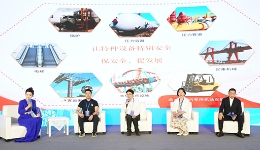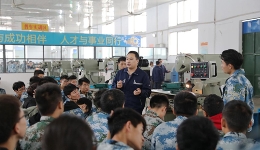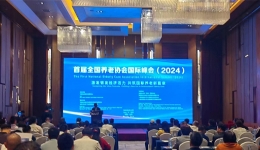Original title: The Degree Law was voted and passed to clarify the "three levels and two categories" degree system - (citation)
Let the classified cultivation and evaluation of talents have laws to follow (theme)
Sun Mingyuan, reporter of Science and Technology Day
Recently, the Academic Degrees Law of the People's Republic of China (hereinafter referred to as the Degree Law) was adopted at the 9th meeting of the Standing Committee of the 14th National People's Congress and will come into force on January 1, 2025. This marks the first "overhaul" of the academic degree system since the implementation of the Regulations of the People's Republic of China on Academic Degrees (hereinafter referred to as the Regulations on Academic Degrees) in 1981.
The head of the Office of the Academic Degrees Committee of the State Council and the Department of Policies and Regulations of the Ministry of Education said that the Academic Degrees Law has further improved the conditions for degree awarding and encouraged degree awarding units of different types, levels, levels and characteristics to develop with their own characteristics. While stipulating the conditions for degree awarding, the Degree Law gives degree awarding units more autonomy in running schools and academic autonomy.
"The degree law is one of the education laws that has been revised, researched and demonstrated for the longest time, and can be described as" coming out after a thousand calls ". Qin Huimin, the named chair professor of Beijing Foreign Studies University and the dean of the School of International Education, believes that the introduction of the degree law provides a strong legal guarantee for the construction of a powerful educational country.
Standardize degree awarding
On January 1, 1981, the Regulations on Academic Degrees came into force, and China's higher education has a legal system. The degree regulations provide a basic institutional guarantee for China's high-level talent training.
"However, after more than 40 years of development, the original degree system is facing many challenges." Qin Huimin introduced that the positive law of the degree regulations has been difficult to adapt to the reform and development of degree work and graduate education. Although in the existing education laws, the degree regulations have the longest implementation time and the most extensive scope of law application, it is also a law that involves the most specific legal disputes and has the highest appeal for revision in judicial practice.
In this context, the promulgation of the Degree Law not only responds to the long-term demands of educators and legal workers, but also directly affects the reform and development of China's degree system and graduate education.
Compared with the degree regulations, the degree law has been revised from 20 articles to seven chapters and 45 articles, covering the qualifications, conditions, procedures, and degree quality assurance for degree awarding, and further improving the degree work system and degree awarding qualification system to meet the reform and development trend of higher education and practical requirements.
Qin Huimin pointed out that the degree law contains several highlights, that is, it clarifies the implementation of the "three levels and two categories" degree system in China, clarifies the decentralization principle of establishing a provincial degree committee, confirms the expanded autonomy reform of degree awarding units to independently add degree awarding points, and clarifies the requirements and regulations for graduate students and their instructors.
"Compared with the degree regulations, the degree law has strengthened the normative function, safeguard function, adjustment function, guidance function and evaluation function of the law, which is of great significance for the high-quality development of higher education." Qin Huimin said that the degree law is the embodiment of the significant reform of higher education based on the law, which emphasizes the importance of the law for degree awarding.
Wang Zhanjun, professor of the School of Humanities and Social Sciences of Beijing University of Technology and director of the Graduate Education Research Center, has long been concerned about the development of the degree system. In his view, the promulgation of the Degree Law marks the maturity of China's degree system.
The degree law clearly stipulates that China implements the degree system of "three levels and two categories". Article 2 of the Academic Degrees Law stipulates that the State implements the academic degree system. The degrees are divided into bachelor's degree, master's degree and doctor's degree, including academic degree, professional degree and other types, which are awarded according to the discipline category and professional degree category.
"With the progress of science and technology, society's demand for talents has changed significantly. Classified training and evaluation are important measures to meet social needs and serve national development," said Wang Zhanjun. Degree level and degree type are the most critical and basic content of the degree system, as well as the important factor and symbol of whether the degree system is sound and perfect.
Establish a scientific training system
The degree law provides legal guidance for the classified cultivation of academic and professional degree graduates. Wang Zhanjun believed that educators should integrate educational ideas, training concepts, training programs, training models, evaluation indicators, etc. into the provisions of the Degree Law.
Wang Zhanjun took the cultivation of professional degree graduates as an example. Early professional degree graduate education developed slowly, and the number of professional degree graduates accounted for a small proportion of the total number of graduate students. Most graduate training units have almost no independent professional degree graduate education management organization, which is generally managed together with academic degree graduate education. However, with the rapid development of professional degrees, some graduate training units have begun to set up independent professional degree management institutions.
At present, the number of professional degree postgraduate enrollment in China has increased significantly, accounting for an increasing proportion of the total number of postgraduate enrollment. From the specific practice of postgraduate training, China has a variety of postgraduate training models with different educational systems, including two years, two and a half years, three years and so on. Wang Zhanjun believes that this is the embodiment of the diversified needs of society.
In Wang Zhanjun's view, in addition to educational management organizations, the training models and evaluation standards of different types of graduate students will also accelerate the separation and standardization. The degree method further clarifies the differential evaluation criteria of the two types of degrees in the degree awarding conditions, in which academic degrees highlight academic research ability and professional degrees highlight professional practice ability.
"However, from the perspective of quantity and quality, our talent cultivation has not fully met the social needs. For example, the society now needs a lot of compound talents, but it is difficult to cultivate compound talents to meet the social needs in a short time due to the influence and restriction of traditional training habits and institutional framework. We need to re strategically position the traditional training model, which also needs guidance at the national level. " Wang Zhanjun said.
The promulgation of the Degree Law makes different assessment methods for different types of talents. In the past, the degree regulations required that graduate students should not only complete the course assessment and complete the credits, but also pass the course examination and thesis defense in order to obtain a degree. Today, the Degree Law refines this requirement into two aspects, namely, completing academic research training or professional practice training, and passing the prescribed defense of practical achievements. This improves the assessment mechanism from the perspective of law, with more emphasis on classified development and training.
The head of the Office of the Academic Degrees Committee of the State Council and the Department of Policies and Regulations of the Ministry of Education mentioned that in 2023, the Ministry of Education issued the Opinions on Deepening the Classified Development of Academic Degree and Professional Degree Graduate Education. With the passing of the Degree Law, in the next step, the training unit should implement the requirements of the Degree Law, adhere to the problem orientation, respect for laws, overall promotion, and mechanism innovation, focus on the transformation and upgrading of the existing talent training process in the direction of integration of science and education, industry and education, and strengthen the connection and coordination of reform measures in the whole chain and all links.
For degree awarding units, such as colleges and universities, they should take degree awarding as the starting point, optimize the layout of disciplines and majors, strive to explore the development direction and educational laws of different types of graduate education, strengthen the mechanism of integration of production and education for professional degrees, and formulate training programs suitable for academic and application-oriented talents by classification. Explore the evaluation criteria based on academic papers, patents, software copyrights, achievements transformation and application and other diversified forms, and finally establish and improve a comprehensive evaluation mechanism that conforms to the characteristics of the discipline and training types.
"Degree awarding units should be based on the degree law, adhere to the scientific evaluation orientation, grasp the training objectives and characteristics of academic and professional degree postgraduates, formulate evaluation standards of different categories and levels, and establish a talent evaluation system suitable for the education of academic and professional degree postgraduates," said Wang Zhanjun.
At the same time, the degree law has left institutional space for further exploring the establishment of other degree types. Wang Zhanjun said that the degree system must adapt to social development. With the further development of society, the future degree type system may continue to expand to meet the diverse needs of society.


















